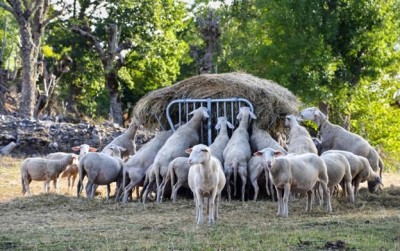Cornell Sheep Flock Protocols to Manage Listeriosis

STANDARD OPERATING PROCEDURE FOR LISTERIOSIS
This article is originally from Cornell's Sheep Program Website. The following information is for educational purposes only. Any treatment protocols should be developed while working with your veterinarian for a confirmed diagnosis and treatment plan, including the use of antibiotic prescriptions.
Listeriosis occurs from time to time in the Cornell Sheep flock. Sheep are far more susceptible to listeriosis than are cattle. Prompt treatment of sheep with listeriosis and timely euthanasia of animals that do not respond to treatment are imperative.
Signs
Neurologic form - a selection of the following:
Depressed, off feed, circling, ataxic, hang head or twist head or neck to one side, drool, tongue hangs out one side of mouth, cud stuck in cheek, ear droop, can't close eyelid on one side (thus may appear to be blind), corneal ulcer from exposure, dropped jaw, unable to rise, convulsions. Some are just found dead.
Septicemic form:
Abortion or death of late pregnant ewes. Lambs (infected in utero) through umbilicus, from ewe's milk, or from eating spoiled silage) will be depressed, maybe with diarrhea.
Treatment
DO NOT SEND FOR SLAUGHTER. By law, animals with listeriosis may not be slaughtered for meat. Therefore affected animals must be either treated immediately or euthanized.
Wear gloves/wash hands if the head is handled and whenever correcting dystocias or removing aborted fetuses or placentas. LISTERIOSIS IS ZOONOTIC. RABIES MIGHT BE PRESENT INSTEAD. As of July 11, 2023, all antibiotics, including the ones below, require a veterinary prescription. If you currently have antibiotics still in inventory at your farm, This treatment schedule can be used as a guideline.
Treat with either:
Oxytetracycline 200 mg/mL (Biomycin200), 5 mL/l00 pounds SC once or twice a day for at least 5 days. Do not slaughter for 45 days. Available by prescription through a veterinarian only.
Penicillin, 10 mL/100 pounds once or twice a day for at least 5 days. Do not slaughter for 21 days. Available by prescription through a veterinarian only.
Treat with thiamine also (10 mg/kg at least twice a day) unless a classic severe unilateral facial nerve paralysis is present - polioencephalomalacia can resemble listeriosis. Down adults should receive 60 mL calcium gluconate. If late pregnant, treat for pregnancy toxemia but wear gloves when dosing with propylene glycol.
Pen separately so food and water will be accessible and other sheep will not trample the animal. If 24 hours after beginning treatment the animal is unable to sit upright or if it is eating and drinking nothing, euthanize or call for veterinary evaluation. If a veterinarian has already diagnosed listeriosis and the sheep has not responded to treatment in 24 hours, euthanize with captive bolt (or request barbiturate euthanasia by a veterinarian if confirmation of the listeria diagnosis or exclusion of rabies is required).
Prevention
Avoid feeding spoiled silage. If the TMR has heated, discard instead of feeding. The organism multiplies in silage that did not ferment properly or where exposure to air allows the pH to rise. Listeria also grow well at cold temperatures, so winter conditions provide no protection. Clean manger of all uneaten silage or TMR daily. Remove this feed from the pen entirely if possible, otherwise add bedding so sheep and lambs are less apt to eat the old silage. Rear orphans artificially so they don't pick at spoiled silage on the ground. If forage quality and conditions are not ideal, use silage preservatives to hasten acidification of the silage. Protect AgBags and baylage from anything that would put holes in the plastic wrapper. Avoid incorporating dirt into the forage at the time of harvest - the listeria organism is commonly found in dirt.
For more information on sheep-related topics, stop by the Cornell Sheep Program website at: https://blogs.cornell.edu/news...
Upcoming Events
WNY Pastureland Conversion & Soil Health Field Day
July 16, 2025
Middleport, NY
Join American Farmland Trust for the Western New York Soil Health Field Day on July 16, 2025, at Zeliff Farm in Middleport, NY, from 9:00 AM-3:15 PM. Learn about pasture conversion, soil health benchmarking, biochar in grazing systems, and best grazing practices. Plus, enjoy hands-on demos with the NY Soil Health Trailer, drones, and cover crops! Check out the attached agenda for more information about the field day and REGISTER HERE. Zeliff Farms is a regenerative beef operation who has recently partnered with AFT on outreach and education to farmers including learning circles and evaluating biochar effects on soil health.
IPM Strategies to Protect Corn and Soybean Seed in NY
July 30, 2025
Hamburg , NY
SWNYDLFC and Cornell IPM are hosting a grower meeting to discuss integrated pest management strategies for protecting corn and soybean seed in New York.
FAMACHA Training for Sheep and Goat producers in Woodhull NY
August 13, 2025 : FAMACHA Training in Woodhull
Woodhull, NY
Join us for a discussion and hands-on training for internal parasite integrated pest management in sheep and goats. Certification is available to all students participating in the workshop.
Announcements
No announcements at this time.





